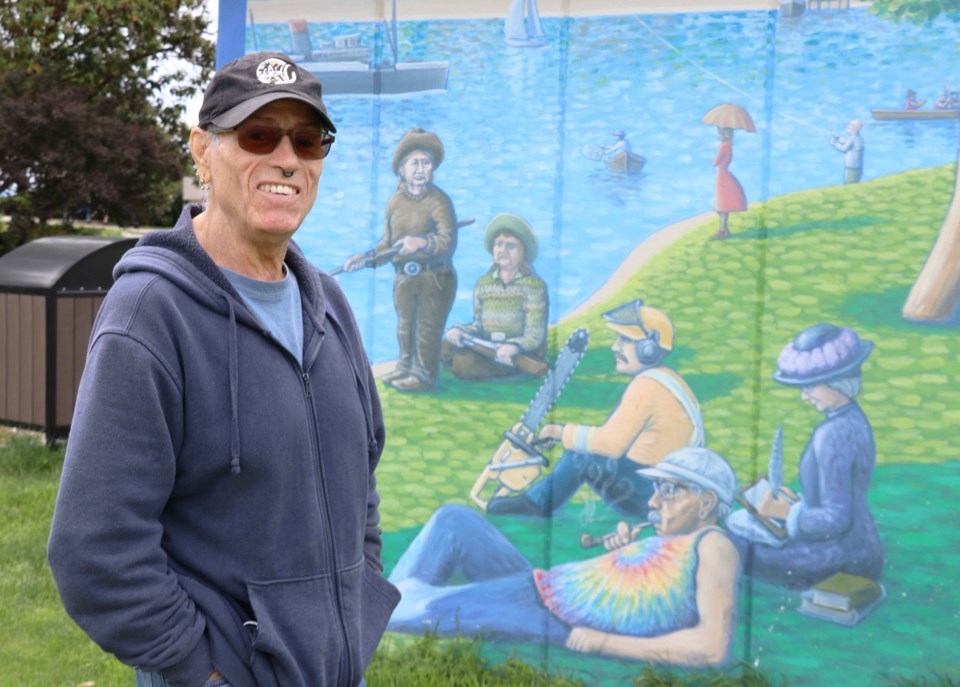Last month, Danny Owsnett sold Sechelt’s 420 Hemp Shop, which he opened as a cannabis accessories and hemp store in 2002. Owsnett is staying on with the new owners for a time to help with the transition and then moving on.
Shortly after the sale, Coast Reporter sat down with Owsnett to talk the experience of running the store over two decades of changing attitudes and changing laws.
“When I first opened, people would cross the street rather than be seen walking in front of our store,” said Owsnett. “We had people do things like open the door and scream at us.”
The store didn’t even sell marijuana back then.
How it started
Two decades ago, Owsnett had only been to the Coast to drive as fast as he could from one end to the other on his motorcycle. But after a relative died and left him some money, he wanted to buy a house and the Coast was affordable.
He was not intending to work. “All of the time that I’ve been working at this business, I’ve been HIV positive,” said Owsnett. “It’s a disease that at any time can take you and taking care of yourself becomes a priority that you never had before.
“I really didn’t want to stress too much. I wanted to get a house and just relax and spend the rest of my life there.”
But, Owsnett was in need of medical cannabis and there was nowhere to get the cannabis or the accessories on the Coast, he said. A business idea sprouted.
Owsnett had never sold anything and knew nothing about business. He built the Cowrie Street shop up from an empty store, learning on the fly while navigating the taboo surrounding the cannabis industry. “You weren’t chatting about it all the time and reading stories about it,” he said. “Our knowledge was very limited.”
“It was very, very difficult in the beginning,” said Owsnett. “We lost more money in the hemp business than we ever made in the accessories business.”
More than a business
But at it’s heart, the 420 Hemp Shop wasn’t about the money. Owsnett lives frugally and didn’t need to take much out of the business – he just wanted to keep people employed and fought to keep his staff on full-time, no matter what.
The store also became a hub.“There were a lot of young people who came to us because they were abused, they were scared, and this gave them a place to come and feel free and safe.
“And we welcomed them.”
“It was important to me to keep that going,” said Owsnett.
Though he’s not leaving the business with much financially to show for it, Owsnett says he wouldn’t have done anything differently. “I’m a socialist. I’ve never really wanted to run a store and I never really wanted to sell anything,” he said. “I started this business without thinking about the fact that I was using my employees to make profit, which is something I didn’t believe in. And I still don’t.”
When cannabis dispensaries became more common in the mid 2010s, despite legalization still being a few years off (2019), 420 Hemp decided to start selling cannabis illegally in the back of their store. Then the Community Safety Unit (CSU) shut that down, Owsnett recounts.
So, 420 was one of the first on the Coast to get its cannabis retail licence, even though Owsnett didn’t approve of how Ottawa was proceeding with legalization. “They were ignoring the people who have been working in the industry for – some people for all of their lives,” said Owsnett.
“They went from busting people like myself to selling cannabis.”
The government being both distributors and retailers of cannabis frustrated Owsnett. “They opened all these stores that were in direct competition with the ones they were giving licences to.”
When 420 got its licence, they were required to liquidate half of their inventory and could no longer sell hemp, they could only sell cannabis and accessories used for consumption.
The store lost a lot of customers when they first got into legalized cannabis – the prices were too high, said Owsnett. “That’s changed a lot now. They seem to drop the price of cannabis every every month over the last year and a half, which I suppose is good for the for the customers, but not so much for the retailers.”
After those decades, now Owsnett's having to say an emotional good bye. “This is what made me who I am.”
“I was much different before,” said Owsnett. “I had been homeless living in a cardboard box and I hadn’t worked for a number of years due to mental illness.
“I made myself and emotionally improved my self via the store.”
Financially, selling the store leaves Owsnett without income and he’s quite ill, making the Coaster concerned for his long-term financial stability. And socially, Owsnett's world has been the store.
“I’m not super excited that I’ve sold my store and I’m retiring,” he said. “I feel like I’ve lost. I’ve lost something valuable.”
“I think that Sechelt and maybe the Sunshine Coast has lost something too.”



